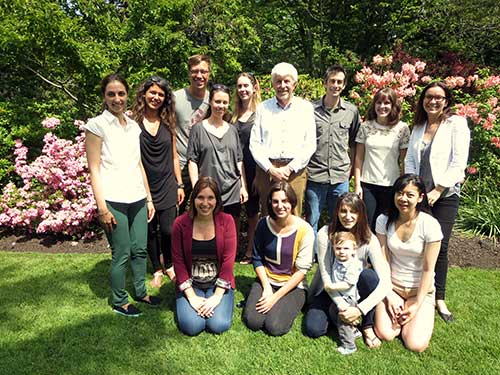Alumni

Previous Post-Docs
Wokje Abrahamse, Banting Post-Doctoral Fellow 2011-2013
Representative Publications: Abrahamse, W., & Steg, L. (2013). Social influence approaches to encourage resource conservation: A meta-analysis. Global Environmental Change, 23(6), 1773-1785. Abrahamse, W., Steg, L., Vlek, C., & Rothengatter, T. (2007). The effect of tailored information, goal setting, and tailored feedback on household energy use, energy-related behaviors and behavioral antecedents. Journal of Environmental Psychology, 27(4), 265-276. |
Fabio Iglesias, 2008-09 
Representative Publications: Iglesias, F., & Gunther, H. (2009). A espera na vida urbana: Uma analise psicossocial das filas [Waiting and urban life: A social psychological analysis of lines]. Psicologia em Estudo, 14(3), 537-545. Iglesias, F. (2001). Infracoes e acidentes: Tentativas de explicacao e de reducao. [Traffic violations and accidents: Explanation and reduction attempts]. Arquivos Brasileiros de Psicologia, 53(3), 112-124. |
Michelle Yik, 1999-00
Representative Publications: Yik, M., Russell, J. A., & Steiger, J. H. (2011). A 12-point circumplex model of core affect. Emotion, 11, 705-731. Yik, M. (2010). Affect and interpersonal behaviors: Where do the circumplexes meet? Journal of Research in Personality, 44, 721-728. |
Paul Trapnell, 1997-99
Representative Publications: Buckels, E.E., Trapnell, P.D., and Paulhus, D.L. (2014). Trolls just want to have fun. Personality and Individual Differences, 67, 97-102. Trapnell, P.D., & Paulhus, D.L. (2012). Agentic and communal values: Their scope and measurement. Journal of Personality Assessment, 94, 39-52. Meson, C. & Trapnell, P. D. (2004). Development and validation of a five-factor sexual satisfaction and distress scale for women: The sexual satisfaction scale for women (SSS-W). Journal of Sexual Medicine, 2, 66-81. Trapnell, P. D., & Campbell, J. D. (1999). Private self-consciousness and the five-factor model of personality: Distinguishing rumination from reflection. Journal of Personality and Social Psychology, 76(2), 84-304. |
Completed PhD Students
 Karine Lacroix, 2019 Karine Lacroix, 2019
Representative publications:
Lacroix, K., Gifford, R., & Rush, J. (2019). Climate change beliefs shape the interpretation of forest fire
events. Climatic Change. https://doi-org.ezproxy.library.uvic.ca/10.1007/s10584-019-02584-6
Lacroix, K., & Gifford, R. (2019). Reducing meat consumption: Identifying group-specific inhibitors using
latent profile analysis. Appetite 138: 233-241. https://doi.org/10.1016/j.appet.2019.04.002
Lacroix, K., Gifford, R., & Chen, A. (2019). Developing and validating the Dragons of Inaction
Psychological Barrier (DIPB) scale. Journal of Environmental Psychology 63: 9-18.
Gifford, R., Lacroix, K., & Chen, A. (2018). Understanding responses to climate change: Psychological
barriers to mitigation and a new theory of behavioral choice. In Clayton, S., & Manning, C. (Eds.),
Psychology and climate change: From denial and depression to adaptation and resilience (pp. 161-183).
Lacroix, K. (2018). Comparing the relative mitigation potential of individual pro-environmental
behaviors. Journal of Cleaner Production 195: 1398-1407. https://doi.org/10.1016/j.jclepro.2018.05.068
Lacroix, K., & Gifford, R. (2018). Psychological barriers to energy-conservation behavior: The role of
worldviews and climate change risk perception. Environment and Behavior 50: 749-780. https://doi-
|
Devan Kronisch, 2019
.
|
Christine Kormos, 2016
Representative publications: Kormos, C. (2016). Meta-analysis: An analysis of analyses. In R. Gifford (Ed.), Research Methods for Environmental Psychology. Hoboken, NJ: Wiley. Hine, D., Kormos, C., & Marks, M. (2016). Agree to disagree: A practical guide to conducting survey research in Environmental Psychology. In R. Gifford (Ed.), Research Methods for Environmental Psychology. Hoboken, NJ: Wiley. Khorsand, I., Kormos, C., MacDonald, E. G., & Crawford, C. (2015). Wind energy in the city: An interurban comparison of social acceptance of wind energy projects. Energy Research & Social Science, 8, 66-77. Kormos, C., Gifford, R., & Brown, E. (2015). The Influence of Descriptive Social Norm Information on Sustainable Transportation Behavior: A Field Experiment. Environment & Behavior, 47, 479-501. Kormos, C., & Gifford, R. (2014). The validity of self-report measures of proenvironmental behavior: A meta-analytic review. Journal of Environmental Psychology, 40, 359-371. Gifford, R., Kormos, C., & McIntyre, A. (2011). Behavioral dimensions of climate change: drivers, responses, barriers, and interventions. WIREs Climate Change, 2, 801-827. |
Angel Chen, 2015
Chen, A., & Gifford, R. (2015). "I wanted to cooperate, but...": Justifying suboptimal cooperation in a commons dilemma. Canadian Journal of Behavioural Science, 4, 282-291. |
Lindsay McCunn, 2011-2016
Representative Publications:
McCunn, L. J., & Frey, C. (2020). Impacts of large-scale interior murals on hospital
employees: A pharmacy department case study. Journal of Facilities Management, 18, 53-70.
McCunn, L. J., Vickerie, L., & Gagnon, T. (2020). Evaluating a pop-up resource village in West
Oakland: Making connections with sense of place and perceptions of safety. International
Journal of Community Well-being. 1-26. DOI: https://doi.org/10.1007/s42413-019-00048-4
Davis, R., McCunn, L. J., Wilkerson, A., & Safranek, S. (2020). Nurses’ satisfaction with
patient room lighting conditions: A survey of nurses in four hospitals with differences in the
environment of care. Health Environments Research & Design Journal. 1-15. DOI:
McCunn, L. J. (2019). Visions of a modern middle school: Participatory design with non-student stakeholder groups. Journal of School Leadership, 29, 1-19. DOI: https://journals.sagepub.com/doi/10.1177/1052684619845692
|
Reuven Sussman, 2015
Representative publications: Sussman, R., Lavallee, L., & Giffford, R. (2016). Pro-Environmental Values in a Competitive Versus Cooperative Resource Dilemma. Journal of Social Psychology, 156, 43-55. Sussman, R., & Gifford, R. (2013). Be the Change You Want to See: Modeling Food Composting in Public Places. Environment & Behavior, 45, 323-343, DOI: 10.1177/0013916511431274. Sussman, R., Greeno, M., Gifford, R., & Scannell, L. (2013). The Effectiveness of Models and Prompts on Waste Diversion: A Field Experiment on Composting by Cafeteria Patrons. Journal of Applied Social Psychology, 43, 24-34. Sussman, R., & Gifford, R. (2012). Please turn off the lights: The effectiveness of visual prompts. Applied Ergonomics, 43, 596-603. |
Jessica Rourke, 2014
|
Leila Scannell, 2014
Representative Publications: Scannell, L., & Gifford, R. (2013). Personally relevant climate change: The role of place attachment and local versus global message framing in engagement. Environment & Behavior, 45, 60-85. Scannell, L., & Gifford, R. (2010c). The relations between natural and civic place attachment and pro-environmental behavior. Journal of Environmental Psychology, 30, 289-297. Scannell, L., & Grouzet, F.M.E. (2010b). The metacognitions of climate change. New Ideas in Psychology, 28, 94-103. Scannell, L., & Gifford, R. (2010a). Defining place attachment: A tripartite organizing framework. Journal of Environmental Psychology, 30, 1-10. |
//jemgibso
Representative Publications: Coates, L., Bavelas, J.B., & Gibson, J. (1994). Anomalous language in sexual assault trial judgments. Discourse and Society, 5, 189-206. |
Yuko Howes, 2004
|
Donald Hine, 1994
Representative Publications: Hine, D.W., Clarke, K., Marks, A.D.G., & Morgan, M.I. (2018). Feelings about fracking: Using the affect heuristic to understand public opposition to coal seam gas production. Risk Analysis, 39, 586-598. DOI: 10.1111/risa.13168 Jones, C., Hine, D.W., & Marks, A.D.G. (2016). The future is now: Reducing psychological distance to increase public engagement with climate change. Risk Analysis, 37, 331-341. DOI: 10.1111/risa.12601. Hine, D.W., Phillips, W.J., Cooksey, R., Reser, J.P., Nunn, P., Marks, A.D.G., Loi, N.M., & Watt, S.E. (2016). Preaching to different choirs: How to engage audiences that are dismissive, uncommitted or alarmed about climate change. Global Environmental Change, 36, 1-11. Hine, D.W., Reser, J.P., Morrison, M., Phillips, W.J., Nunn, P., & Cooksey, R. (2014). Audience segmentation and climate change communication: Conceptual and methodological considerations. Wiley Interdisciplinary Reviews – Climate Change, 5, 441-459. DOI: 10.1002/wcc.279 |
Julia MacDonald, 1994
Representative Publications: MacDonald, J.E., & Gifford, R. (1989). Territorial cues and defensible space theory: The burglar's point of view. Journal of Environmental Psychology, 9(3), 193-205. |
Jennifer Veitch, 1992
Representative Publications: Veitch, J.A. (2012). Work environments. In S. D. Clayton (Ed.), The Oxford Handbook of Environmental and Conservation Psychology (pp. 248-275). New York: Oxford University Press. Veitch, J.A., Stokkermans, M.G.M., & Newsham, G.R. (2013). Lighting lighting appraisals to work behaviors. Environment and Behavior, 45(2), 198-214. Newsham, G.R., Birt, B.J., Arsenault, C., Thompson, A.J.L., Veitch, J.A., Mancini, S., ... Burns, G.J. (2013). Do ‘green’ buildings have better indoor environments? New evidence. Building Research & Information, 41(4), 415-434. doi: 10.1080/09613218.2013.789951 |
Cheuk Ng, 1989
Representative Publications: Ng, C. F. (2016). Behavioral mapping and tracking. In R. Gifford (Ed.), Research methods in environmental psychology (Ch. 3, pp. 29-52). Wiley & Sons. Ng, C. F. (2006). Academics telecommuting in open and distance education universities: Issues, challenges and opportunities, in the special issue entitled “Academics Working in Open and Distance Learning Universities” of International Review of Research in Open and Distance Learning, 7(2). http://www.irrodl.org/index. Ng, C.F., Northcott, H.C., & Abu-Laban, S.M. (2007). Housing and living Arrangements of South-Asian immigrant seniors in Edmonton, Alberta. Canadian Journal on Aging, 26(3), 185-194. Ng, C.F. (2003). Satisfying Shoppers' Psychological Needs: From Public Market to Cyber-Mall. Journal of Environmental Psychology, 23, 434-450. |
Brian O'Connor, 1987
Representative Publications: O’Connor, B. P. (2018). An illustration of the effects of fluctuations in test information on measurement error, the attenuation of effect sizes, and diagnostic reliability. Psychological Assessment, 30(8), 991-1003. O'Connor, B. P. (2002). The search for dimensional structure differences between normality and abnormality: A statistical review of published data on personality and psychopathology. Journal of Personality and Social Psychology, 83, 962–982. |
Completed Master's Students
Max Pittman, 2019
Thesis: Nature Soundscapes and Cognitive Performance in an Office Environment
Current Position: Master's Student of Architecture at UCLA
Li Qin Tan, 2018
Thesis: Raising Support for Potable Water with the Elaboration Likelihood Model
Current Position: Assistant Manager, Transformation & Research Analytics, Public Transport Council, Singapore
Publications:
Scannell, L., Tan, L., Cox, R., & Gifford, R. (2019). Place attachment, well-being and resilience. In K. Bishop, & N. Marshall. (Eds.). The Routledge Handbook of People and Place in the 21st-Century City. New York, NY: Routledge.
Sussman, R., Tan, L., & Kormos, C. (2019). Behavioral interventions for sustainable transportation: An overview of program and guide for practitioners. In J. Zhang (Ed.). Transport and Energy Research: A Behavioral Perspective. Amsterdam, ND: Elsevier.
Karine Lacroix, 2015
Thesis: Cultural values and climate change
Amanda McIntyre, 2012
Thesis: Empathy and Environmental Concern: Examining the Mediating Role of Nature Relatedness
Lindsay McCunn, 2011
Thesis: Organizational commitment and green buildings
Reuven Sussman, 2009
Thesis: Effectiveness of prompts and models on food composting by restaurant patrons
Christine Kormos, 2009
Thesis: Anticipated changes to quality of life and the impact of divergent social normative information: A field experiment on sustainable transport behaviour
Leila Scannell, 2008
Thesis: Natural and civic place attachment and the relation to pro-environmental behaviours in Trail and Nelson, British Columbia
Kasia Major, 2006
Thesis: Resources depletion and the development of prejudice
Anomi Bearden, 2006
Thesis: Communication and uncertainty in resources dilemmas
Stephen Eso, 1990
Thesis: Psychosocial adjustment to multiple sclerosis
Timothy Gallagher, 1984
Thesis: Distance estimation as a factor of the proximity and humanness of the target
Completed Honours Students
Charlotte Estey, 2019: Why do people engage in environmental activism?
Holly Conklin, 2017: Association between perception of introversion and reported social anxiety symptoms
Lauren Colborne, 2016: Understanding climate change and mental health: The role of place attachment in the experience of eco-anxiety
Madelyn Cain, 2016: Influence of personality in various stress scenarios
Kayla Smart, 2013: What we can’t perceive can still influence us: A look at priming effects on the self
Priya Bains, 2013: Perceiving others: Friend versus lover accuracy in dyadic interpersonal perception
Emma Fraser, 2012: Choosing green products
Carlin Moxley Haegert, 2012: Willingness to pay for climate change
Christine Eugster, 2011: How do we describe others?
Victoria Wood, 2011: Detecting environmental attutides with an IAT measure
James Beland, 2011: Acquaintance court 3 (with James Gibson)
Kelli Gibbons, 2010: Acquaintance court 2 (with James Gibson)
Lia Best, 2009: Attractiveness and social evaluation theory (with James Gibson)
Ildiko Kovacs, 2009: Personal wealth and choices in a commons dilemma
Sabrina White, 2009: Test of the social evaluation theory loneliness hypothesis
Brandon Lum, 2008: It's all about where you come from: The influence of community and cultural background on decision making in commons dilemmas
Nick Facey, 2008: Acquaintance court (with James Gibson)
Tia Eggleston, 2008: Nonverbal cues to romantic rapport
Leanne Davies, 2008: Nonverbal cues to romantic rapport
Rebecca Bruser, 2006: Nonverbal cues to romantic rapport
Sandra Storoschuk, 2006: Development of a scale to measure environmental extremism
Christine Jackson, 2005: National park visitors = attiudes toward wild carnivores
Melanie Prince, 2005: Relationship satisfaction in same-occupation couples
Sasha Wade, 2005: Visitor behaviour and perception of bears, wolves and cougars at Pacific Rim National Park Reserve.
Tara Morley, 2005:The effects of company responses to complaints on consumer satisfaction and post-purchase behaviours
Amrit K. Dhariwal, 2001: Dilemmas in the commons: What are the roles of social evaluation and reward size?
Heather Schmidt, 1999: Fishing for a wealth disparity: Unequal wealth and social values in a commons dilemma
Krystal J. Arndt, 1999: Intimacy cues as predictors of the quality of romantic relationships
Graham Brown, 1997: Evaluating architects' predictions of public preferences for architecture
Currently Assistant Professor; Entrepreneurship, University of Victoria Peter B. Gustavson School of Business.
D'Arcy Reynolds, 1995: Comparing other-related zero-acquaintance impressions and measured intelligence: A Brunswik lens analysis
Currently Assistant Professor of Psychology, University of Southern Indiana. Research interests include online therapy, session impact, therapeutic alliance, psychotherapy process research, and online data collection.
Ryanne Conley, 1994: The effects of environmental uncertainty, conformity, and risk-seeking propensity on individual harvests in a commons dilemma.
Rachel Meredith, 1994: Social values, moral suasion and cooperation in a simulated commons dilemma
Kathleen Ham, 1994: Defensible space theory revisited: Police officers', burglars', and residents' perceptions of vulnerability to burglary
Michael H. Miller, 1992: The effects of communication and pool size on harvesting efficiency and trust in a commons dilemma
Peter Bieling, 1990: Nonverbal dominance behaviour: A test of the two-factor gender-specific model
Myles Bruns, 1989: Recycling and energy conservation: Awareness, information and commitment
Paul F. Boray, 1988: Effects of warm white, cool white, and full-spectrum fluorescent lighting on performance, mood, and evaluations
Katherine Taylor, 1987: Gender differences and environmental contexts in romantic love
Russell Day, 1987: Individual differences in the perception of social behavior
Lurene L. Haines, 1984: Density and territoriality: The effects on classroom performance
James Young, 1983: Leadership style: Changes in Master of Public Administration students
Paul Sacilotto, 1983: The influence of person-thing orientation and isolation on personal space
Timothy Sackmann, 1980: The effects of learned helplessness on risk-taking